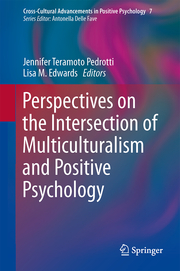Detailansicht
Perspectives on the Intersection of Multiculturalism and Positive Psychology
Cross-Cultural Advancements in Positive Psychology 7
ISBN/EAN: 9789401786539
Umbreit-Nr.: 5968264
Sprache:
Englisch
Umfang: xviii, 274 S., 2 s/w Illustr., 274 p. 2 illus.
Format in cm:
Einband:
gebundenes Buch
Erschienen am 07.04.2014
Auflage: 1/2014
- Zusatztext
- The volume will be a collection of chapters about current theory, research, and practice related to multiculturalism and positive psychology. This book will serve as a reference to any who are interested in the intersection of positive psychology and multicultural context. While many in the field of positive psychology have begun to move more strongly towards a culturally-embedded approach that recognizes the importance of context in discussing, viewing and cultivating strengths in individuals from different backgrounds, there is still a dearth of research in this area compared with studies that take a cross-cultural approach (comparing people from different countries) or one that is purported to be "culture-free" or universal in its application. While it is becoming more common to see various articles or chapters published on these topics, there is still no comprehensive text aimed at discussion of the collection of these topics presented in a cohesive and structured way. This book aims to fill this gap in the literature. In this book, a broad definition of culture is utilized that includes such facets as race, ethnicity, socioeconomic or social class status, disability, religion, sexual orientation and gender. This book is intended to present research, theory and suggestions for practice that are grounded in diverse cultural contexts and current scholarship. It will assist researchers, students and practitioners who are studying and working within diverse populations. Currently there exists no comprehensive text that addresses the intersection of positive psychology and multiculturalism. Several edited volumes address positive psychology constructs (e.g., well-being, optimal experience, autonomy) across cultures, but they do not focus on multicultural populations within the United States. Other books focus more specifically on mental health applications and stress and coping among multicultural populations, however these books do not provide a broad perspective on psychology beyond this application piece. The proposed book will review current theory and research about constructs in addition to applications across contexts. Finally, other published books have focused on youth within multicultural society; this volume is more broad in its address of issues of positive psychology across the lifespan and across various aspects of identity including disability, gender, social class and sexual orientation.
- Kurztext
- This book provides the first comprehensive collection of topics that lie within the intersection of positive psychology and multicultural issues. Written by leaders in the field and using a broad definition of culture (including race, ethnicity, socioeconomic or social class status, disability status, religion/spirituality, sexual orientation, and gender), this book reviews relevant research, theory, and suggestions for practice and highlights the importance of considering context within a strengths-based framework. Beginning with a history of the intersection of multiculturalism and positive psychology and issues related to measurement and methodology, the volume proceeds to specific examples of current research in multiple areas of cultural identity. Finally, domains (e.g., school, work, psychotherapy) in which the findings of this work can be applied are described, as are directions for future theory and research in this area.This volume is aimed at students, scholars, and practitioners across several fields including multicultural psychology, positive psychology, counseling and clinical psychology, school psychology, social psychology, as well as marriage and family counseling, and social work. It will serve as an important reference to any who are interested in learning about the intersection of positive psychology and multiculturalism.
- Autorenportrait
- InhaltsangabeForeword; Shane J. Lopez.- Preface; Jennifer Teramoto Pedrotti and Lisa Edwards.- Part I. Theoretical Underpinnings and Research Issues.- Chapter 1. History of Cultural Context in Positive Psychology: We Finally Come to the Start of the Journey; Christina Downey and Edward C. Chang.- Chapter 2. Broad Definitions of Culture in the Field of Positive Psychology; Heather N. Rasmussen and Lea Lavish.- Chapter 3. Multicultural Considerations in Measurement and Classifications of Positive Psychology; Cristalis Capielo, Lauren Mann, Baileu Nevels and Edward Delgado-Romero.- Chapter 4. Methodological Issues in Positive Psychology Research with Diverse Populations: Exploring Strengths among Chinese Adults; Samuel M.Y. Ho, Tina L. Rochelle, Lawrence S.C. Law, Wenjie Duan, Yu Bai and Shih-Ming Shih.- Part II. Specific Constructs.- Chapter 5. Affective Well-Being Viewed through a Lens of Race and Ethnicity; Hung-Bin Sheu.- Chapter 6. Cognitive Constructs in the Context of Positive Psychology; Christine Robitshek, Danielle Sirles and Erin E. Hardin.- Chapter 7. Relationships in Multicultural Contexts; Belinda Campos and Sharon Shenhav.- Part III. Specific Populations.- Chapter 8. Positive Psychology across the Lifespan; Jeanne Nakamura, Michael Waren, Brittany Branand, Pi-Ju Liu, Brett Wheeler and Thomas Chan.- Chapter 9. Positive Psychology and Gender; Matt Englar-Carlson and Rebekah Smart.- Chapter 10 Religion, Spirituality and Positive Psychology: Strengthening Well-Being; Melissa D. Falb and Kenneth I. Pargament.- Chapter 11. Social Class Mobility and Positive Psychology; Michael L. Weymeyer and Karrie A. Shogren.- chapter 13. Positive Psychology and LGBTQ Populations; Sharo G. Horne, Julia A. Puckett, Raphael Apter and Heidi M. Levitt.- Part IV. Applications of Positive Psychology in Multicultural Contexts.- Chapter 14. Positive Psychological Practices in Multicultural School Settings; Casey A. Holtz and Michael J. Martinez.- Chapter 15. A Positive Approach to Multiculturalism and Diversity Management in the Workplace; Carolyn M. Youssef-Morgan and James Hardy.- Chapter 16. Infusing Multiculturalism and Positive Psychology in Psychotherapy; Jeana L. Magyar-Moe.- Part V. Conclusion.- Chapter 17. Future Directions for a More Multiculturally Competent (and Humble) Positive Psychology; John Chambers Christopher and Katie Howe.
